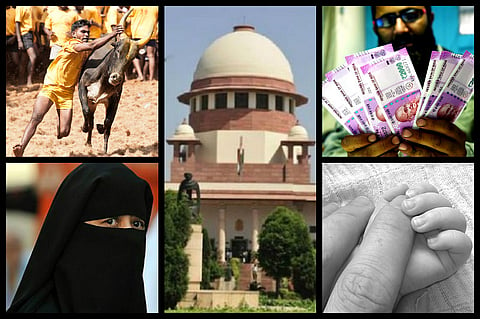

While all that people discuss right now, is the demonetisation of Rs 500 and Rs 1,000 notes by the Centre, 2016 was a year that saw several judgements and policy changes in the country.
While some were positive, and some were not, others were controversial. Here are some of them:
Jallikattu
In January, the Supreme Court sided with animal rights groups and upheld its earlier ban order on the 'Jallikattu' sport in Tamil Nadu, after the Centre had issued a notification lifting the ban.
Despite several villagers and locals in Tamil Nadu protesting the ban, the apex court questioned “the necessity of such festivals” . In a recent meet with Modi, TN CM O Panneerselvam demanded that the Centre should clearly denotify bulls as "performing animals", and also asked for a new clause added in the Prevention of Cruelty to Animals Act, 1960 specifically exempting Jallikattu.
Women entering places of religious worship
In April, the Bombay High Court ruled that, "Ultimately, it is the fundamental right of a woman and the government’s fundamental duty to protect their (women) right."
The order is considered a landmark judgement, giving women devotees the same rights as men.
Since then, several women, led by activist Trupti Desai have entered the inner sanctum of the Haji Ali dargah. They also plan to enter Sabarimala's Ayyappa temple in January next year.
Freedom of speech
In a landmark verdict, the Supreme Court in May stated that the "Freedom of expression was not an absolute right," and upheld the constitutional validity of criminal defamation.
Abortion
The Supreme Court this year allowed a rape victim in Mumbai to abort her 24-week-old abnormal foetus after clarification that a 20-week cap on termination of pregnancy is not applicable if the woman’s life was found to be in grave danger.
The Health Ministry has since also proposed that failure of contraceptive will be a lawful reason for abortion irrespective of whether the woman is married or single. However, this is yet to get the necessary Cabinet and Parliamentary nod.
Sedition
In August, the apex court stated that criticism of the government did not constitute sedition.
In a brief order, it said “we are of the considered opinion that the authorities while dealing with the offences under Section 124A of the Indian Penal Code shall be guided by the principles laid down by the Constitution Bench in Kedar Nath Singh vs. State of Bihar case. Except saying so, we do not intend to deal with any other issue as we are of the considered opinion that it is not necessary to do so.”
Triple Talaq
The Allahabad High Court, ruled in favour of women's rights, when it stated that the practice of 'Triple Talaq', where a Muslim man can give an oral divorce to his wife, was unconstitutional.
"Triple talaq is unconstitutional; it violates the rights of Muslim women. No Personal Law Board is above the Constitution," the court said in its order.
National Anthem verdict
In the end of November, the Supreme Court received both bouquets and brickbats after it ruled that all cinema theatres had to play the national anthem ahead of every movie screening.
The apex court said that the national flag should be displayed on the screen during the time the national anthem is played. The order said that every person present in the theatre must rise and pay respect to the national anthem.
"When the national anthem is played it is imperative for everyone to show honour and respect. It would instil a sense of committed patriotism and nationalism," the court said.
Surrogacy Bill
With regard to policy, the government also took a key decision to the health prospect of surrogate mothers. It gave its nod for the introduction in Parliament of the Surrogacy Regulation Bill, 2016.
The bill proposes a ban on commercial surrogacy and allows ethical surrogacy to needy infertile couples.
Demonetisation
When Prime Minister Narendra Modi announced the Centre’s demonetisation move on November 8, India dropped everything else and lined up at banks and ATMs.
However, with an acute currency crunch faced by the masses showing no signs of abating in the near future, many who first praised the move, have begun critisizing its implementation.